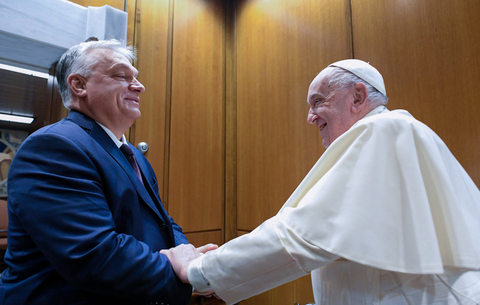Exclusive Interview with National Bank President Járai
The 2010 deadline for adapating the euro cannot be reached, but as of now a later date has not been set. The so called Convergence Plan is under construction, but how and by whom still remains a mystery. The economic program devised by PM Gyurcsány is fundamentally flawed, it is based on raising taxes and prices instead of cutting expenditures. Zsigmond Járai, President of the Hungarian National Bank provided this picture in an ex exclusive interview to hvg.hu
hvg.hu: You criticized Hungary's Convegence Program, without knowing what it entails. Why did you rejected it at first hand, and what would you suggest instead?
Zs. J: Indeed, we don’t know what the plan entails, or who is designing it. We know however that tax and price increases, announced by the Gyurcsány administration, would be the backbone of the plan. That scheme is fundamentally flawed. Large tax increases could lead the economy to the wrong direction, set back business activity, hurt competition, push companies in the black economy, speed up inflation, and would present only temporary solution. No doubt, in the short run the plan could work: by next year the budget deficit could shrink to 6 percent from this year's expected 10 percent of the GNP, together with the improvement of the balance of payment. The fundamental problems however will stay with us.
hvg.hu: Then what should be the solution?
Zs. J: Large cuts in the government expenditures should have been the top priority. Roughly 50 percent of Hungary’s GDP is redistributed by the state, whereas most economists would accept a 40 percent redistribution rate in a country.
hvg.hu: But clearly, a drastic cut in government expenditures would have a huge effect on citizens. There are 3 million pensioners who rely on the state as well as 1 million public employees. And cutting expenditures before the local government elections? Should the pensions be decreased? Or the welfare payments?
Zs. J.: This is for the government to decide. I can’t give any advice on this. Nonetheless, a more equitable pension system is needed, in which an individual's pension is proportional to his or her life-long contributions. The current system clearly cannot be sustained. Further: the ratio of the active work force in Hungary compared to the population as a whole is one of the lowest in Europe. In the West European democracies, first the economy had to reach certain level, only then was the government able to finance welfare spending. Hungary was doing it the other way around, and now the bill has been presented.
hvg.hu: Opposition leader Viktor Orbán believes that lowering taxes could best serve the country. Is it really, with respect of the current dire economic situation?
Zs. J.: It is possible, if expenditures are cut even faster than taxes: 42 percent of the GDP comes from tax revenues; lowering it to 30 percent would definitely benefit the economy. But this requires drastic cuts in expenditures.
hvg.hu: Let’s get back to the secretive Convergence Program. What we know is that Prime Minister Gyurcsány, György Surányi, Tibor Draskovics, and a few other insiders are working on the plan, while the finance ministry has already completed a framework. The numbers can be substituted, depending on the new date set to the introduction of the euro. That could be postponed to 2012, or 2013, maybe later...
Zs. J.: I cannot confirm that information. Certainly, members of the Convergence Board, György Surányi, András Simor, and Erik Bogsch are knowledgeable experts, but they don’t have any responsibilities, their assignment is unknown, the Board has no supporting staff. I asked the members of the Board, what exactly are they going to do? “We will check that the numbers are correct, and that various elements of the scheme are coherent” - was the answer. The Board doesn’t have any means to complete this task. They requested participation of the Hungarian National Bank’s representative in their recent meeting, and he did participate. They would like to involve our expert in the background work, and I have nothing against it.









